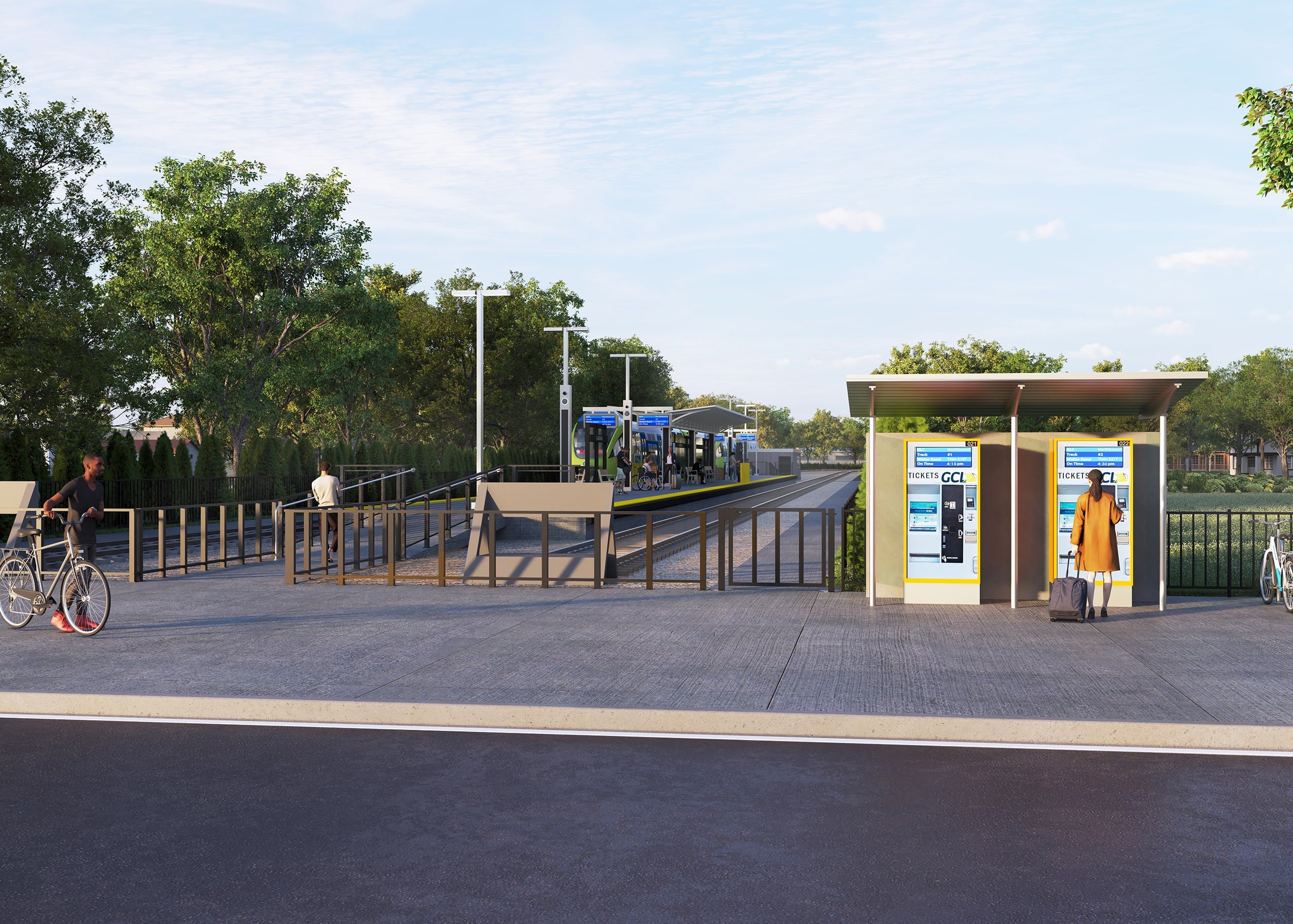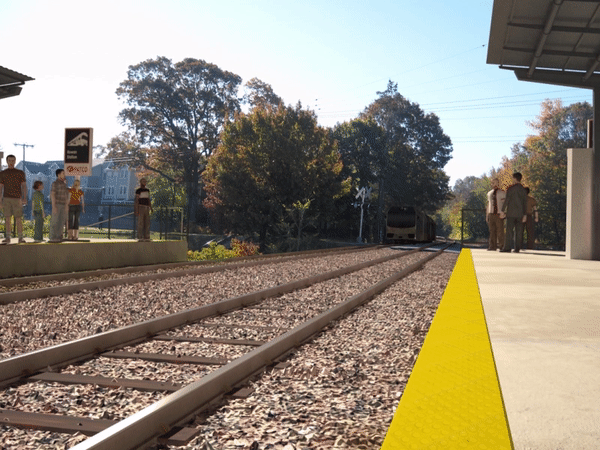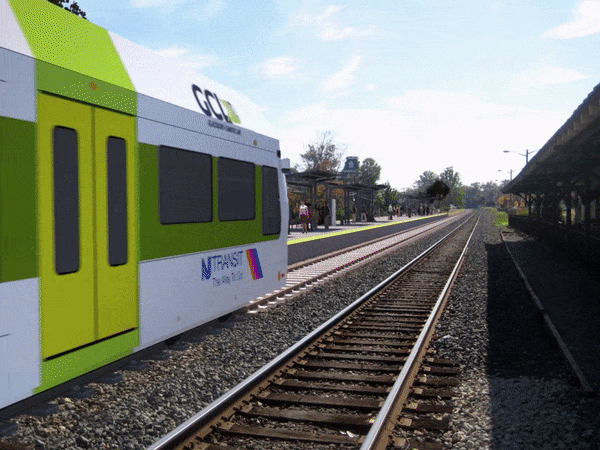
I’m a Salem County teacher who lives in Camden near the proposed Cooper Hospital stop on the planned Glassboro-Camden light rail line (GCL).

I’m a Salem County teacher who lives in Camden near the proposed Cooper Hospital stop on the planned Glassboro-Camden light rail line (GCL).

A proposed rail line from Camden to Glassboro that was first floated 25 years ago is entering a new phase. Some commuters are anxious to see it completed.

Southern New Jersey is significantly under served by fixed rail transit network relative to southeastern Pennsylvania and Northern New Jersey. GCL is a key opportunity to address this deficiency and benefit the rapidly growing communities in Southern New Jersey.
There are a number of key drivers to the need for increased transit services in the corridor. For example, the Delaware Valley Regional Planning Commission’s (DVRPC) Connections 2045 Plan for Greater Philadelphia estimates that Gloucester County’s population and employment will grow by 29% between 2015 and 2045. This projected growth is the highest of all the counties within the Metropolitan Planning Organization (MPO) planning area and will need to be focused in order to contain sprawl. The GCL will become a key component to help focus this growth, provide mobility options and congestion relief.
In addition to overall increased travel demand from Gloucester County commuters, the two termini of the proposed line, Camden and Glassboro, have experienced significant growth over the last two decades and will continue to redevelop and grow. The City of Camden is undergoing transformative redevelopment and growth with developments such as the Knights Crossing Campus headed up by Campbell Soup and Brandywine Realty Trust, the Krishna P. Singh Technology Campus by Holtec, the Philadelphia 76ers training facility, and the Camden Waterfront Project led by Liberty Property Trust, to name a few.
The Borough of Glassboro and Rowan University have also experienced significant growth and expansion with student enrollment increasing from approximately 9,578 students in 2006 to over 19,000 in 2019. Glassboro is near completion of its ambitious $400 million downtown redevelopment project jointly lead by the Borough and Rowan University. More than 80 acres have been transformed with over 2,000 market rate residential units, more than 100 new businesses, and 300,000 square feet of restaurant and retail space. In addition, the Rowan University/Rutgers-Camden Board of Governors “Eds and Meds” program has transformed both Glassboro and Camden and created a strong demand for connections between the two campuses since 2000.
Economic studies and evaluation the impacts/benefits from transit can be found at American Public Transportation Association, Railvolution.org, and other industry sources. A study commissioned by the Gloucester County Planning Division in 2012 also examined the potential benefits from the GCL.
In fact, studies show the benefits of transit-oriented development (TOD) last a lifetime. An AARP study of walkable, mixed-use neighborhoods in Northern Virginia found that people ages 75 and older took 20 percent more transit trips per week than their suburban counterparts. Another AARP study examines state policies that are needed to help older adults age in place including integrating land use, housing and transportation; and, providing more transportation choices, particularly for older adults who no longer drive.
Students will benefit because the GCL will link key institutions including Rowan University, Rutgers-Camden, Camden County College, Cooper Hospital, and others.
Workers will benefit because the GCL will provide access to the large employment base throughout the alignment and will offer commuters an alternative to driving. It also expands employment opportunities to those who are transit dependent.
The aging population will benefit because the GCL will provide mobility choices which are currently limited and will connect to a network of healthcare facilities as well as other establishments needed for everyday living.

The Glassboro-Camden Line (GCL) remains on track to significantly impact transportation in South Jersey. The new commuter rail line will benefit thousands of commuters while strengthening communities, creating jobs, bolstering economies, and promoting economic development.
This week, the light-rail project achieved a significant project milestone with the completion of a comprehensive Environmental Impact Study (EIS). The EIS was a critical phase that carefully reviewed the project’s environmental impacts. Nationally recognized transportation experts conducted the study with feedback from hundreds of members of the community.
“The GCL project is a vital transportation link for South Jersey, one that is long overdue,” said Jeffrey L. Nash, Camden County Commissioner, and DRPA Vice Chairman. “The GCL will serve to reduce our carbon footprint, increase property values for homeowners, spark economic opportunities for businesses, and provide a convenient means of transportation for workers, students, and those who want easy access to the universities, hospitals, and cities.”
The GCL is an 18-mile passenger light rail line that will traverse Gloucester and Camden counties, including the communities of Glassboro, Pitman, Sewell, Mantua Township, Deptford Township, Wenonah, Woodbury Heights, Woodbury, Westville, Brooklawn, Gloucester City and Camden. The GCL restores passenger rail service in a corridor that historically provided passenger rail service.
The South Jersey Transportation Authority (SJTA) has committed $200 million towards the next phase of the project- preliminary engineering design and project management.
“South Jersey Transportation Authority is pleased to invest in this transformative project,” said Stephen F. Dougherty, SJTA Executive Director. “This project will reduce traffic congestion, provide greater transportation options, and advance environmental stewardship.”
“The GCL will effectively extend the Philadelphia-Camden metropolitan area,” said John T. Hanson, DRPA CEO and PATCO President. “This commuter rail line will provide convenient transportation for workers, students, and those who want easy access to the many cultural, recreational, educational, economic and medical resources on both sides of the river.”
To view the environmental impact study, click here.

The Glassboro-Camden Line (GCL) Project Team has selected the infrastructure consulting firm, South Jersey Transit Partners (SJTP), to provide preliminary engineering and design (PED), project management, and professional services for the pre-construction phase of the light rail line. SJTP is a joint venture between AECOM and STV Incorporated, two nationally recognized transit planning and engineering firms.
This action moves the GCL closer to construction with the start of the next phase of this important project that will expand connections between communities in South Jersey by restoring passenger rail service.
“The GCL is an important initiative to improve mobility by offering quick, reliable, and frequent rail service to the region,” said Bane Gaiser, chief executive of AECOM’s U.S. East and Latin America region. “Our SJTP joint venture is incredibly proud to continue our crucial work, leveraging our deep understanding of the GCL’s objectives, the project’s scope, stakeholder engagement, and public needs to successfully deliver a transportation option that will have a positive impact on the day-to-day lives of South Jerseyans.”
The PED phase is a critical part of the project as it will define the overall project configuration and develop a strategic construction plan. This phase, which is expected to take three years, provides design specifications and contract documents, secures right-of-way acquisitions and easements, and performs geotechnical and utility surveys.
In addition, SJTP will provide project management office functions, including continued community relations and public involvement for the GCL throughout the design and construction phases.
The Glassboro-Camden Line is an 18-mile passenger light rail line that will traverse Gloucester and Camden counties. It will restore passenger rail service along an existing rail line, with the goal of increasing mobility and improving links between established communities, jobs, and activity centers in the region.
The GCL project is managed by the Delaware River Port Authority (DRPA) with NJ Transit and the South Jersey Transportation Authority (SJTA) serving as project partners.
“We expect public transportation to be even more important in the future,” said John T. Hanson, DRPA CEO. “The time is now to build permanent infrastructure that will provide the residents and businesses in South Jersey with safe and equitable access to key destinations and to create opportunities for business expansion and employee recruitment.”